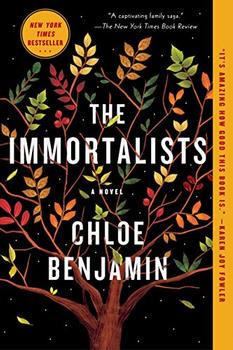Summary | Excerpt | Reading Guide | Reviews | Beyond the Book | Readalikes | Genres & Themes | Author Bio

A Novel
by Chloe Benjamin1.
When Saul dies, Simon is in physics class, drawing concentric circles meant to represent the rings of an electron shell but which to Simon mean nothing at all. With his daydreaming and his dyslexia, he has never been a good student, and the purpose of the electron shell—the orbit of electrons around an atom's nucleus—escapes him. In this moment, his father bends over in the crosswalk on Broome Street while walking back from lunch. A taxi honks to a stop; Saul sinks to his knees; the blood drains from his heart. His death makes no more sense to Simon than the transfer of electrons from one atom to another: both are there one moment, and gone the next.
Varya drives down from college at Vassar, Daniel from SUNY Binghamton. None of them understand it. Yes, Saul was stressed, but the city's worst moments—the fiscal crisis, the blackout—are finally behind them. The unions saved the city from bankruptcy, and New York is finally looking up. At the hospital, Varya asks about her father's last moments. Had he been in any pain? Only briefly, says the nurse. Did he speak? No one can say that he did. This should not surprise his wife and children, who are used to his long silences—and yet Simon feels cheated, robbed of a final memory of his father, who remains as close-lipped in death as he was in life.
Because the next day is Shabbat, the funeral takes place on Sunday. They meet at Congregation Tifereth Israel, the conservative synagogue of which Saul was a member and patron. In the entryway, Rabbi Chaim gives each Gold a pair of scissors for the kriah.
"No. I won't do it," says Gertie, who must be walked through each step of the funeral as if through the customs process of a country she never meant to visit. She wears a sheath dress that Saul made for her in 1962: sturdy black cotton, with a dart-fitted waistline, front button closure, and detachable belt. "You can't make me," she adds, her eyes darting between Rabbi Chaim and her children, who have all obediently slit their clothes above the heart, and though Rabbi Chaim explains that it is not he who can make her but God, it seems that God can't, either. In the end, the rabbi gives Gertie a black ribbon to cut, and she takes her seat with wounded victory.
Simon has never liked coming here. As a child, he thought the synagogue was haunted, with its rough, dark stone and dank interior. Worse were the services: the unending silent devotion, the fervent pleas for the restoration of Zion. Now Simon stands before the closed casket, air circulating through the slit in his shirt, and realizes he'll never see his father's face again. He pictures Saul's distant eyes and demure, almost feminine smile. Rabbi Chaim calls Saul magnanimous, a person of character and fortitude, but to Simon he was a decorous, timid man who skirted conflict and trouble—a man who seemed to do so little out of passion that it was a wonder he had ever married Gertie, for no one would have viewed Simon's mother, with her ambition and pendulum moods, as a pragmatic choice.
After the service, they follow the pallbearers to Mount Hebron Cemetery, where Saul's parents were buried. Both girls are weeping—Varya silently, Klara as loudly as her mother—and Daniel seems to be holding himself together out of nothing more than stunned obligation. But Simon finds himself unable to cry, even as the casket is lowered into the earth. He feels only loss, not of the father he knew but of the person that Saul might have been. At dinner, they sat at opposite ends of the table, lost in private thought. The shock came when one of them glanced up, and their eyes caught—an accident, but one that joined their separate worlds like a hinge before someone looked away again.
Now, there is no hinge. Distant though he was, Saul had allowed each Gold to assume their separate roles: he the breadwinner, Gertie the general, Varya the obedient oldest, Simon the unburdened youngest. If their father's body—his cholesterol lower than Gertie's, his heart nothing if not steady—had simply stopped, what else could go wrong? Which other laws might warp? Varya hides in her bunk. Daniel is twenty, barely a man, but he greets guests and lays out food, leads prayers in Hebrew. Klara, whose portion of the bedroom is messier than everyone else's, scrubs the kitchen until her biceps hurt. And Simon takes care of Gertie.
Excerpted from The Immortalists by Chloe Benjamin. Copyright © 2018 by Chloe Benjamin. Excerpted by permission of G.P. Putnam's Sons. All rights reserved. No part of this excerpt may be reproduced or reprinted without permission in writing from the publisher.
Your guide toexceptional books
BookBrowse seeks out and recommends the best in contemporary fiction and nonfiction—books that not only engage and entertain but also deepen our understanding of ourselves and the world around us.